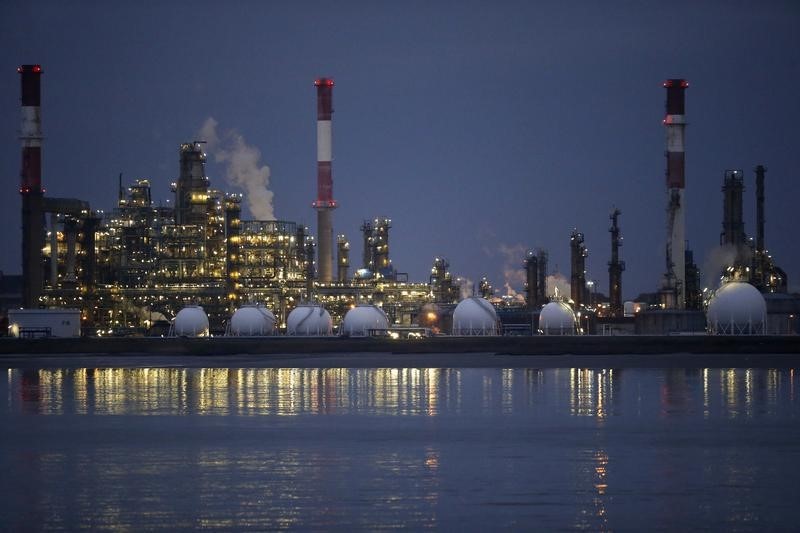* Rising coronavirus infections spark demand worries
* U.S. stimulus package stuck in political deadlock
* Brent crude price contango deepens
(Updates prices)
By Bozorgmehr Sharafedin
LONDON, July 28 (Reuters) - Oil prices fell on Tuesday, as
U.S. lawmakers prepared to wrangle over an economic stimulus
package and investors worried about a rise in coronavirus cases
worldwide.
Brent crude LCOc1 was down 4 cents, or 0.1%, at $43.37 a
barrel at 1331 GMT, while West Texas Intermediate (WTI) U.S.
crude CLc1 fell 36 cents, or 0.9%, to $41.24 a barrel.
"Oil continues to trade in a range with its supply
fundamentals helping to set a floor while the economic and
demand outlook is providing the cap," said Harry Tchilinguirian,
head of commodity research at BNP Paribas.
U.S. Republicans and Democrats faced difficult talks on
Tuesday on how best to recover from the coronavirus pandemic,
after Republicans unveiled a relief proposal four days before
millions of Americans lose unemployment benefits. Investors also awaited the outcome of the U.S. Federal
Reserve's policy-setting panel meeting on Tuesday and Wednesday.
The panel is expected to reiterate that interest rates will
remain near zero for years to come. Brent crude was deeper in contango LCOc1-LCOc2 , a market
structure in which the future price of the commodity is higher
than the spot price, encouraging a build up of inventories.
October prices as much as 49 cents per barrel above
September levels, compared to a 1 cent difference in early July.
"This suggests that the tightening we were seeing in the
market has eased somewhat, with the demand outlook more
uncertain given the resurgence of COVID-19 cases in some
regions," said Warren Patterson, ING's head of commodities
strategy.
U.S. inventory data may show refined product stockpiles
declined last week, while crude oil stockpiles are expected to
have held steady, five analysts polled by Reuters estimated.
On the downside for fuel demand, Europe's largest low-cost
airline Ryanair cut its annual passenger target on Monday by a
quarter and warned that a resurgence in coronavirus infections
could lower that further.
- English (USA)
- English (UK)
- English (India)
- English (Canada)
- English (Australia)
- English (South Africa)
- English (Nigeria)
- Deutsch
- Español (España)
- Español (México)
- Français
- Italiano
- Nederlands
- Português (Portugal)
- Polski
- Português (Brasil)
- Русский
- Türkçe
- العربية
- Ελληνικά
- Svenska
- Suomi
- עברית
- 日本語
- 한국어
- 简体中文
- 繁體中文
- Bahasa Indonesia
- Bahasa Melayu
- ไทย
- Tiếng Việt
- हिंदी
UPDATE 5-Oil falls as U.S. fiscal package faces tough talks
Published 07/28/2020, 01:20 PM
Updated 07/28/2020, 10:00 PM
UPDATE 5-Oil falls as U.S. fiscal package faces tough talks

Latest comments
Install Our App
Risk Disclosure: Trading in financial instruments and/or cryptocurrencies involves high risks including the risk of losing some, or all, of your investment amount, and may not be suitable for all investors. Prices of cryptocurrencies are extremely volatile and may be affected by external factors such as financial, regulatory or political events. Trading on margin increases the financial risks.
Before deciding to trade in financial instrument or cryptocurrencies you should be fully informed of the risks and costs associated with trading the financial markets, carefully consider your investment objectives, level of experience, and risk appetite, and seek professional advice where needed.
Fusion Media would like to remind you that the data contained in this website is not necessarily real-time nor accurate. The data and prices on the website are not necessarily provided by any market or exchange, but may be provided by market makers, and so prices may not be accurate and may differ from the actual price at any given market, meaning prices are indicative and not appropriate for trading purposes. Fusion Media and any provider of the data contained in this website will not accept liability for any loss or damage as a result of your trading, or your reliance on the information contained within this website.
It is prohibited to use, store, reproduce, display, modify, transmit or distribute the data contained in this website without the explicit prior written permission of Fusion Media and/or the data provider. All intellectual property rights are reserved by the providers and/or the exchange providing the data contained in this website.
Fusion Media may be compensated by the advertisers that appear on the website, based on your interaction with the advertisements or advertisers.
Before deciding to trade in financial instrument or cryptocurrencies you should be fully informed of the risks and costs associated with trading the financial markets, carefully consider your investment objectives, level of experience, and risk appetite, and seek professional advice where needed.
Fusion Media would like to remind you that the data contained in this website is not necessarily real-time nor accurate. The data and prices on the website are not necessarily provided by any market or exchange, but may be provided by market makers, and so prices may not be accurate and may differ from the actual price at any given market, meaning prices are indicative and not appropriate for trading purposes. Fusion Media and any provider of the data contained in this website will not accept liability for any loss or damage as a result of your trading, or your reliance on the information contained within this website.
It is prohibited to use, store, reproduce, display, modify, transmit or distribute the data contained in this website without the explicit prior written permission of Fusion Media and/or the data provider. All intellectual property rights are reserved by the providers and/or the exchange providing the data contained in this website.
Fusion Media may be compensated by the advertisers that appear on the website, based on your interaction with the advertisements or advertisers.
© 2007-2024 - Fusion Media Limited. All Rights Reserved.